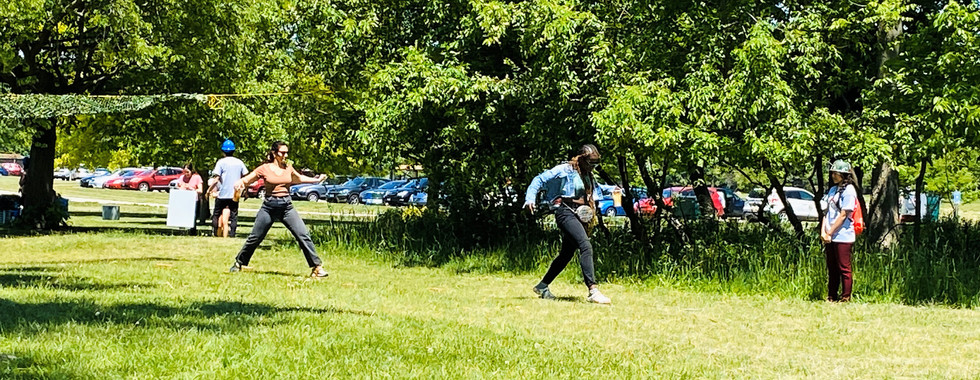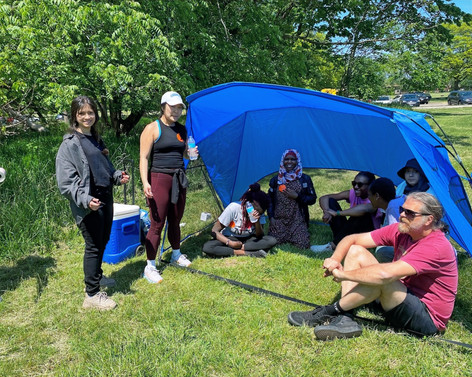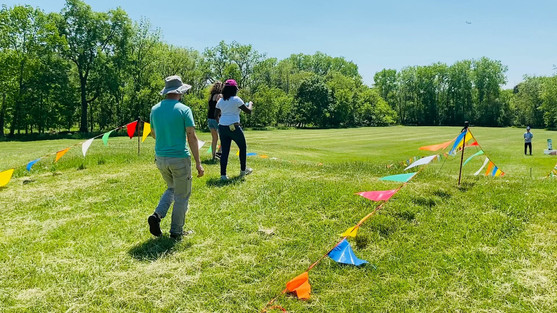Teaching "Rules of War"
- REACH

- May 26, 2023
- 7 min read
Updated: May 29, 2023
An Interactive Simulation Challenge
Summary Report

REACH's International Humanitarian Law Simulation Event on May 21st was a huge success. Over 90 people from different backgrounds and cultures joined us last Sunday for a fun and educational obstacle course designed by our Peer Mentors. The course challenged our guests to apply the core principles of IHL in various scenarios involving environmental risks that can occur during and after armed conflict.
Our youth leaders from Afghanistan, Iraq, Myanmar, Sudan and the U.S. organized and led the public event to raise awareness about the rules of war, the challenges faced by refugees, and the importance of protecting civilians and cultural heritage. They used interactive and immersive activities to help our guests learn more about these issues. This event was part of our REACH Peer Mentor Leadership Program, which aims to empower young people to tackle critical problems through social innovation. We believe that these youth-led initiatives can have a positive impact on their academic and career goals, as well as on the environment and community they live in. By engaging young people in social and environmental campaigns, we help them to develop skills, confidence and leadership. We also promote collaboration and sustainability by partnering with other organizations and involving community stakeholders in our projects.
The Purpose
Lina, age 15 originally from Iraq, launched the simulation by explaining its purpose. Under the shade of a large oak tree, guests learned that International Humanitarian Law (IHL) is a set of rules that seek to limit the effects of armed conflict and that acknowledge the reality of conflict and try to protect humanity. Lina spoke with confidence and clarity, drawing from her own experience of living in a war-torn country.

She then invited the guests to participate in a role-playing game, where they would assume the roles of different actors in a fictional conflict scenario. She explained that the game would challenge them to make decisions based on IHL principles and to consider the consequences of their actions. She hoped that the game would help them understand the importance and complexity of IHL and inspire them to learn more about it.
Prior to sending guests into the simulated war zone, Lina dutifully spelled out the origins of IHL – international treaty law (e.g., Geneva Conventions) and customary international law (consistent practice by set of nations) before articulating the main focus of this year’s simulation to preserve the natural environment from “widespread, long-term, and severe damage.”
Checkpoint 1
At the first checkpoint, guests met Maisam, a 19-year-old from Afghanistan. He explained that they were about to enter a war zone simulation, where they would learn about IHL. He also told them that violating IHL could result in war crimes trials by the International Criminal Court. He pointed out the camouflage tarp that marked the entrance and introduced himself and the other Peer Mentors as UN peacekeepers who would guide them through the obstacle course.

Our peacekeeper briefed the guests on the four key principles of IHL: military necessity, distinction, proportionality, and limited unnecessary suffering. He also stated the objectives of the course: “to survive, to protect civilian life and the natural environment, and to understand the importance of IHL.” He then instructed them to choose one of two paths of stepping stones to enter the war zone.
Checkpoint 2
One path led to a safe area with no occupation, while the other led to a risky area where soldiers were gathered. At the second checkpoint, guests encountered Wagdi, a 14-year-old from Sudan, who addressed them as they exited the correct or incorrect footpaths. “What is your purpose here?” he asked. If guests took the risky pathway where soldiers were gathered, he scolded them for endangering civilians and Lake Michigan. “Give me your passport. You are now a prisoner of war,” stated Wagdi.
If they took the safe path without soldiers, he thanked them for respecting IHL and protecting civilians and the environmental site. “You made a wise choice. You kept Lake Michigan – a fresh water source for millions of people and animals – safe. There are two pathways you must choose from next. Please choose wisely.”
POW Camp
Cing and Mohamed, two young actors from Malaysia and Sudan respectively, portrayed soldier guards in a realistic POW camp simulation. They impressed the guests with their respectful and kind attitude, even making them smile and compliment their performance. Mohamed, age 12, offered cold water to the guests who had to stop their navigation challenge and stay in a hot tent for three minutes. Cing, age 14, then escorted them back to the first checkpoint with courtesy and professionalism.
Checkpoint 3
Guests who reached checkpoint 3 had to choose between a forested corridor with a tire course and an open field with a set of old car tires to run through. At checkpoint three, marked by a poster with images of Yellowstone National Park, Muntadher, age 18 from Iraq, and Esa, age 13 from Afghanistan, greeted them and asked them: “What is your mission here?” Muntadher, playing the role of a UN peacekeeper, waited for guests to try to explain their objectives before telling them their fate: “If you ran through the forested path without landmines, you have made a wise choice. You and this environmental site are safe and you may proceed to checkpoint four.”
The colorful toys in the tires along the open field caught the attention of some guests, who realized with a shock that they were fake landmines. Muntadher explained: "You have fallen into a trap set by the enemy. Land mines destroy the forests and the wildlife. You have chosen a path that represents environmental damage caused by weapons of war. You have put our beautiful national parks at risk and you must return to checkpoint one.” Esa, the pretend soldier, escorted the guests who made the wrong choice back to Maisam or Lina.
The guests who passed the test were given blue eggs and spoons and told to run down a small hill without dropping the egg in thirty seconds. "Hurry up and get to checkpoint four to save the sea turtle eggs!" Muntadher shouted.
Checkpoint 4
Nur Aga, a 17-year-old animal lover from Afghanistan, took his peacekeeping role very seriously. Sheltering from the hot sun under his shade umbrella, he challenged the guests with a question: "What is your purpose here?" By this point in the simulation exercise, our guests were better able to articulate the main objectives and some facts about IHL. Nur Aga gave them feedback or praise accordingly. "If you were too slow or you dropped your egg, you have endangered the baby sea turtles and other animals that depend on the Gulf of Mexico. They are gone forever. You must try this task again or go back to checkpoint one." Nur Aga also explained how other animals benefit from a healthy ocean before giving further instructions to those who reached his checkpoint safely. "If you moved quickly and did not drop the egg, congratulations, civilian! You and the Gulf of Mexico, the coral reef, birds, manatees, and sea turtles are secure. You may proceed to checkpoint 5."

Checkpoint 5
The guests faced five hurdles on the lawn of the forest preserve as they approached checkpoint 5. These hurdles symbolized the need for flexibility and strength to overcome the challenges of war. Kasper, a 16-year-old from the U.S., cheered loudly for the guests as they cleared the last hurdle. “Congratulations! You have survived the war and you protected several key natural environment areas from widespread, long-term, and severe damage.” At this point, our peacekeeper reminded guests of the environmental areas that are protected under IHL, including sources of freshwater and other important resources; National Parks, Prairielands, and Forests; wildlife and their habitats; forests – against deforestation; and gulfs, seas, and oceans. He added: "Please see UN Peacekeeper Payman for your rewards.”
Final Test
Payman, a 15-year-old from Afghanistan, welcomed the guests at his picnic table under a shady tree. He had prepared a quiz on the protection of the natural environment under IHL. This was the moment of truth, in Payman’s eyes. How much did our guests learn and retain? He asked them to name some examples of natural environments that are protected by IHL, such as forests, wetlands, and coral reefs. He also asked them why these environments are important for human well-being and survival, and what other things are protected by IHL, such as civilians, prisoners of war, and cultural property. The final big question: “What are the four key principles of International Humanitarian Law?” Payman rewarded the correct answers with prizes, including toys for the kids and calendars and posters for the adults.
Other Activities & Special Guests
In addition to the spectacular simulation exercise, our guests were invited to picnic with us and engage in a variety of arts and crafts and games. Several REACH board members and volunteers taught guests how to play bocce ball and croquet, assisted children with making bracelets and nature cards, and helped serve a delicious buffet of finger food from our friends at Libanais restaurant and Villa Palermo pizza, both located on Devon Avenue. Our partners at the American Red Cross provided REACH Peer Mentors with IHL t-shirts and first aid kits and brought volunteers to help with music, photography, and games. In addition to co-sponsoring the event, Forest Preserves of Cook County sent staff to participate in the simulation and share information with guests about the natural resources available in our own backyards. We were also pleased to host several young women and their mentors from Girl Forward, another local youth development organization serving newcomers.
Conclusion & Honors
As the Peer Mentors reveal, the International Humanitarian Law simulation project was a remarkable achievement that demanded and demonstrated a high level of creative innovation, perseverance, and organization from our youth leaders. It was a masterful example of planning, collaboration, and coordination. The Peer Mentors explain: “We embraced this theme because we believe that the natural environment is essential for the survival and well-being of all living beings on this planet. When the environment is damaged or destroyed by war, it can have serious consequences for human health, livelihoods and security.” For instance, water sources can be contaminated, crops can be destroyed, forests can be deforested, wildlife can be harmed or displaced, and cultural sites can be plundered or damaged. These actions not only damage the environment, but also violate the core principles of IHL, such as distinction, proportionality, precaution and necessity.

Last year, REACH nominated Peer Mentor Maisam to represent the team at the American Red Cross' International Humanitarian Law Youth Action Campaign Summit in Washington, D.C. in July 2022. During that time, Maisam engaged in seminars with other youth leaders from across the country at the ARC National Headquarters and visited the Pentagon and Capitol Hill. We are pleased to announce that Maisam's little brother Payman was nominated to represent REACH this year and he, too, will be traveling to D.C. this summer to participate in the 2023 IHL-YAC Summit. Congratulations, Payman!









































































































Comments